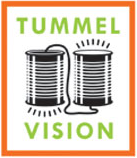All posts tagged social networks
Tummelvision 56: Howard Rheingold on crap detection, collaborative learning, and online community
Podcast: Play in new window | Download
Episode Notes
From SxSW in Austin, Heather Gold and Kevin Marks talk with Howard Rheingold, who has been studying and writing inspiringly about virtual communities since the 1990s, and has been online continually since the mid-1980s. His The Art of Hosting Good Conversations Online is the original Tummler how-to guide.
Enjoy this conversation with the godfather of online tummlers!
TummelVision 55: Juliette Powell on how to tummel, collaborating across disciplines, leaderless revolution, and Dutch schoolchildren
Podcast: Play in new window | Download
Episode Notes
The guest this week is Juliette Powell, media strategist, author of 33 Million People in the Room and co-founder of The Gathering Think Tank. Juliette is a natural-born Tummler who catalyzes ideas and people across business, media and culture.
Juliette and the gang offered some practical tummelling tips, discussed collaboration across disciplines, leaderless revolution, and the social dynamics Dutch schoolchildren (really).
Check out Juliette’s recent discussion on the impact of the social web on the Middle-East revolution[s] with Internet skeptic Evgeny Morozov on BBC’s WHYS blog. Bonus: She is a fellow Canadian along with Heather.
TummelVision 54: Jeff Jarvis on his public parts, revolutionary technologies, and media disruption
Podcast: Play in new window | Download
Episode Notes
In this episode of TummelVision, the gang talks about “public parts,” revolutionary technologies, and media disruption with Jeff Jarvis, author of What Would Google Do? and the forthcoming Public Parts, founder of Entertainment Weekly and professor at City University of New York’s Graduate School of Journalism.
TummelVision 53: Molly Steenson on pneumatic tubes, the links between architecture and social software, and creating meaning without shipping code
Podcast: Play in new window | Download
Episode Notes
This week’s guest is Molly Steenson, a digital strategist, design researcher, architectural historian and Ph.D. candidate at Princeton University.
Molly joins Deb Schultz and Kevin Marks to discuss the implications of IBM’s Watson winning jeopardy, the hidden links between architecture and interface design, and whether “shipping code” is the only measure for creating value.
A few links we discussed in this episode:
- Don Norman, “I have seen the future and I am opposed” – walled gardens and over reliance on tech
- OM Malik, “Change Is Good, But It’s Also Really Hard”
- Ten Mindful Ways to Use Social Media– the human side of how to engage
- TummelVision Ep. 40 guest Dave Gray on Company as organism
- “The Meet Ben Fisher, The Hard Drinking, No Bullshit, Tech Fixer for SXSW” – Tummeling as job description
- TED Conversations launches: Sign of the increasing importance of Tummeling skills moving online
Molly’s work in her own words
“I’m writing about interactivity and its origins in architecture — human-computer interaction in architecture and urbanism. Right now, I’m focusing on Nicholas Negroponte, the founder of the MIT Media Lab. He was trained as an architect and then founded the Architecture Machine Group at MIT in 1968 (which later became the Media Lab in the 1980s). He tried to apply big ideas of artificial intelligence to architecture and urban planning. Think of Watson winning on Jeopardy — now imagine a Watson that could design cities and buildings in a close relationship with a person. That’s what Negroponte had in mind in the 60s and 70s. Obviously, the technology simply wasn’t advanced enough to do it — but the thinking was provocative and really interesting.The interesting thing to me is that figures like Negroponte, Christopher Alexander (who wrote A Pattern Language) and Richard Saul Wurman (who coined the term “information architecture and founded the TED conference) are all architects by training who had a major impact on our digital worlds. Alexander’s idea about patterns were important for object-oriented programming languages, not to mention for game and interface design. Wurman is one of the godfathers of contemporary information architecture. I wonder why these architects didn’t fit well into the field of architecture but mesh so well with the ways we design today for interactivity.
Outside of my academic work, I’m also interested in mobility, mobile phones and future-casting research. I’ve spent a summer in India researching how people share mobile phones — and as we look at sustainable ways of using objects, sharing gets to be important. I’m working on an amazing project with the Institute for the Future that I can’t talk about… I’ve looked at how friendship is changing in China and England thanks to social networking sites.”
TummelVision 52: Paul Ford asks why wasn’t I consulted?
Podcast: Play in new window | Download
Episode Notes
Writer Paul Ford (a.k.a., Ftrain.com) joins Kevin and Deb to talk about the Egyptian revolution, whether Arianna Huffington is a tummler, and the ultimate question of the entire Internet: Why Wasn’t I Consulted?
Paul on Twitter: @ftrain
Quote of the Week: “There is a new role for individuals in the web who serve as ‘antennas’ who collect and feed back to the crowd” – Paul Ford
More links and comments from this episode:
- Danah Boyd on Orkut and flag-waving
- Egyptian Google executive Wael Ghonim’s electrifying interview
- UK Open Rights Group pledge conversation
- Cory Doctorow responds to Evgeny Morozov’s The Net Delusion – We need a serious critique of net activism
- Douglas Rushkoff says “we’d write for free for Arianna, but not AOL” – Huffington Post and AOL: the end of Web 2.0
- The leaked AOL “master plan” memo – The AOL Way
- Farhad Manjoo in Slate echoes Paul Ford’s doubts about the Huffington Post business model – HuffPo’s Achilles’ Heel
- Paul Ford’s instantly influential post that pegged “Why Wasn’t I Consulted” as the fundamental question of the web – The Web Is a Customer Service Medium
- Paul says The Awl looks like a blog, but it is actually an important magazine about culture on the web [not that blogs aren’t important]
- Readability, an incredibly useful tool with a new model for rewarding producers of great writing
- See also Longreads, Arts & Letters Daily, and the collective highlights of Instapaper
- Kevin Marks recommends Among Others by Jo Walton to “understand how books can love you back”
- Paul Ford’s entertaining and informative Ftrain FAQ







